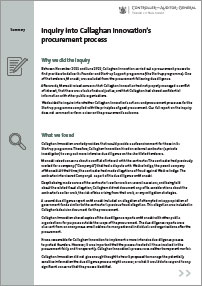Summary of our report
Why we did the inquiry
 Between November 2021 and June 2022, Callaghan Innovation carried out a procurement process to find providers to deliver its Founder and Start-up Support programme (the Start-up programme). One of the tenderers, Manaaki, was excluded from the procurement following due diligence.
Between November 2021 and June 2022, Callaghan Innovation carried out a procurement process to find providers to deliver its Founder and Start-up Support programme (the Start-up programme). One of the tenderers, Manaaki, was excluded from the procurement following due diligence.
Afterwards, Manaaki raised concerns that Callaghan Innovation had not properly managed a conflict of interest, that there was a lack of natural justice, and that Callaghan had shared confidential information with other public organisations.
We decided to inquire into whether Callaghan Innovation’s actions and procurement processes for the Start-up programme complied with the principles of good procurement. Our full report on the inquiry does not comment or form a view on the procurement’s outcome.
What we found
Callaghan Innovation wanted providers that would provide a safe environment for those in its Start-up programme. Therefore, Callaghan Innovation hired an external contractor (a private investigator) to carry out more intensive due diligence on the shortlisted tenderers.
Manaaki raised concerns about a conflict of interest with the contractor. The contractor had previously worked for a company (“Company A”) that had a dispute with We Are Indigo, the parent company of Manaaki. At that time, the contractor had made allegations of fraud against We Are Indigo. The contractor interviewed Company A as part of his due diligence on Manaaki.
Despite being made aware of the contractor’s earlier work on several occasions, and being told about the related fraud allegation, Callaghan did not document any of its considerations about the contractor’s earlier work, the risk of bias arising from that work, or any mitigation strategies.
A second due diligence report on Manaaki included an allegation of attempted misappropriation of government funds similar to the contractor’s previous fraud allegation. This allegation was included in Callaghan’s decision document for the procurement.
Callaghan Innovation shared copies of the due diligence reports on Manaaki with other public organisations for purposes outside the scope of the procurement. The due diligence reports were also sent from an anonymous email address to many external individuals and organisations after the procurement.
It was reasonable for Callaghan Innovation to implement a more intensive due diligence process to protect founders. However, it was important that the process treated all those involved in the procurement fairly and transparently. Callaghan Innovation’s process was neither transparent nor fair.
Callaghan Innovation did not give enough thought to how it proposed to manage the potentially sensitive information the due diligence process might uncover, or what it would do to respond to any significant concerns that the process identified.
The due diligence process lacked natural justice. Manaaki had a limited opportunity to give its version of events in response to the first due diligence report, and no opportunity to respond to the second report
Callaghan Innovation did not adequately consider how a perception of bias created by the contractor’s previous work could taint the due diligence. This has weakened the procurement process and exposed Callaghan Innovation to the risk of challenge.
It was not fair, or reasonable, for Callaghan Innovation to share the due diligence reports without appropriate reason or process, or without giving Manaaki an opportunity to have its response noted.
Although the source of the anonymous leak remains unknown, it is deeply concerning that the due diligence reports made their way into the public domain.
Delivering effective services depends on maintaining trust between the public sector and the businesses that seek to deliver those services. Suppliers taking part in a procurement process expect to be treated fairly and transparently. When they are not, it can negatively affect market confidence and risks eroding trust and confidence in the integrity of the public sector.

